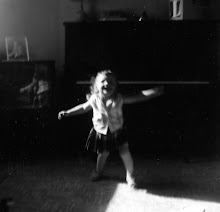Occasionally I stumble on breast cancer blogs when I summon the courage to Google aspects of my illness, and I was glad I did this morning. Sort of. I came across this blog by Trisha Ekstrom (not updated for some months, alas) when I Googled "numbness" and "breast surgery," and found this passage:
I stand in the bathroom doorway, half dressed, trying to explain to Cary the funny feeling running along the back of my armit. The sensation is more pronounced today than on other days. It's like this numbness... It's tingly... It's not painful, but... I struggle to find the right words to explain it. Like your foot is asleep? Cary offers. Yes. That's kind of it. I don't like it...That is it, exactly. It's a horrible feeling but not exactly painful. I went on to do more Googling and discovered scads of women with similar symptoms -- in some cases they went away, and in some they were permanent. Though I've come to accept that the lymph-node removal resulted in a lot of nerve damage (I can't for the life of me think why I didn't research this more before my surgery, or why my surgeon didn't fully explain it), I hadn't realized that similar sensations can occur when breasts have been removed, which has made me think twice about prophylactic mastectomy.
Convinced I have lymphadema, (which I don't--lymphadema specifically refers to swelling of the arm), I grab two of my many books on breast cancer to peruse before going to sleep. I consult Living in the Post-Mastectomy Body first--a book I initially hated. (Sorry Lana. Keep in mind I at first hated Susan Love's The Breast Book too. In fact, I stomped on that one.) Right next to the section on lymphadema is a section titled "Numbness". I read avidly:
"You may notice numbness in the surgical area after your mastectomy. This can occur in a a very small localized area, or extend into the surrounding tissues. There is a major sensory nerve in the armpit and nerves in the chest area that can be cut or injured during surgery. It is usually described as a numb sensation, but that is not how my friends, clients, or I describe it. Numbness implies that all sensation in gone, but what I experienced after surgery was a mixture of numbness and an unpleasant feeling that was very uncomfortable, distracting, and annoying, but not exactly painful.... The numbness seems to come and go with changes in the weather and is influenced by how much the area is rubbed by clothing. I have noticed that fatigue makes it worse..." (pg. 41).
Yes! That's it exactly. Not only that, but it was raining and I hadn't gotten much sleep the night before. Now that the book has been redeemed, I make Cary come listen while I read the section aloud to him. Satisfied somehow to see a description of what I'm feeling in print, I can go to bed (as soon as I read the chapter on treatment for this discomfort).
Trisha Ekstrom was part of The Scar Project, which I also discovered for the first time through her blog: a series of photos of partially naked women with breasts missing, breasts reconstructed, nipples missing, scars in full or partial view. They're beyond striking, often disturbing, sometimes erotic and sultry, always brave and beautiful (don't click on the link if this sort of thing is too much for you), and they made me feel stronger and less fearful, to my surprise.
Through Sitemeter, I can sometimes get a faint picture of those who find my blog when they Google various terms. As you might imagine, some fairly comical connections are made (somebody in Brooklyn found me by entering "burning armpits pleasure" into Google, and I get quite a few hits from people looking for images of Bif Naked since I posted one a while back). Others reassure me that I'm not alone in suffering my weird feelings ("sore numb armpit upper back pain," Googled somebody in Lake Mary, Florida).
Meanwhile, I'm feeling kind of shitty. Yesterday afternoon, though my cold is a fairly minor one, I suddenly got so weary I ended up sleeping all afternoon. I think it may be the heat.








